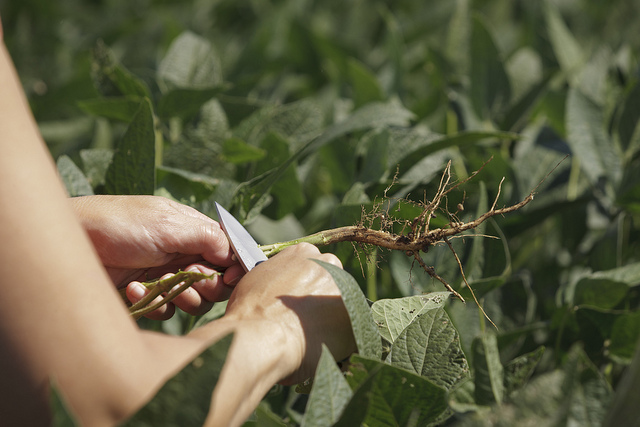
It is the time of year to begin organizing for next year's EcoFarm Conference. And we need your input! Did this year's conference get you thinking about topics that would make an impactful workshop or discussion group? What topics should be expounded upon to support the success of farmers seeking a triple-bottom-line for the benefit of people, planet and profit? We want to hear from you. Share your ideas for consideration in EcoFarm's workshop and speaker selection process. We welcome your suggestions through June 15, 2016 via our online Workshop Suggestion Form. Thank you!
What are EcoFarmers up to? Year-round programs supporting ecological farming with a triple-bottom line
EcoFarm shares the latest activity of the farmers and ranchers who are leading transformative initiatives as part of EcoFarm's Ecological Farmers & Ranchers Alliance (EFRA). EFRA membership is largely made up by fellows who were awarded with a conference fellowship to attend the annual EcoFarm Conference, along with farmers and leaders from the broader ecological agriculture community. Thanks to the generosity of the individuals and businesses who donated to the 2016 Scholarship & Fellowship Fund, EcoFarm was able to award 11 fellowships and 161 scholarships to the 2016 EcoFarm Conference! Following the conference, the EFRA Summit brought together fellows to collaborate on existing projects and shape action plans for the coming year to support farm businesses seeking a triple-bottom line. Read on for project updates...

Livestock Producers
Our Livestock Producers Committee recently guided a project with the support of a USDA Local Food Promotion Grant to identify whether there is regional capacity to establish a USDA inspected meat processing facility on California's Central Coast. The project was conducted in partnership with the California Center for Cooperative Development (CCCD), UC Cooperative Extension, and the Niche Meat Producers Assistance Network (NMPAN), which concluded that there is not sufficient regional production to support a typical full service slaughter facility. However, a separate analysis conducted points to enough poultry and pork production in the region to support a "Plant in a Box" (PIB) that could be an alternative to a full production USDA inspected facility. The Plant in a Box unit could utilize a recycled shipping container and comes ready to go: all the operator needs is a site pad, water, power, and a plan for effluent. EcoFarm and the Livestock Producers Committee is preparing additional research to move forward with a plant while continuing exploring the creation of collaborative services for livestock producers.
Food Safety
The recently updated Food Safety Clearinghouse accessible on EcoFarm's website is designed to provide farmers with an understanding of how food safety affects them and to help them sort out their action plans/next steps around food safety. If you need a food safety plan now, the Food Safety Clearinghouse will guide you through the requirements/process of developing your plan, and offer you the resources to understand how food safety regulations will affect you now and into the future, regularly updated with the consult of Cathy Carlson of Farm Food Safety Consulting.
Seed Security
The Seed Growers Cooperative's goal is to foster an alternative seed initiative by strengthening the community of seed savers and growers, develop marketing opportunities, and collaborate with regional seed companies focusing on production, processing, storage, and distribution of locally-adapted, public domain seed varieties for commercial use. The group is collaborating with Seed Revolution Now! and the Organic Seed Alliance who is organizing field education days, seed production intensives, the purchase of shared equipment, and the development of bioregional seed hubs to learn how seeds and crops succeed in different environments and develop the knowledge around organic seed cultivation through variety trials, data collection tracking, increased availability and diversity, a strong seed network, and greater seed security.
Heritage Grains
Our Grain Growers Cooperative has recently formed to support local and heritage grain growing, milling and processing. Demand is growing regionally for heritage grains that can't be met with current production/resources. The primary limits to growth are equipment, infrastructure, seed, and training. The Grain Growers Cooperative is looking to collaborate with established regional grain groups to explore how to support the needs of aspiring grain producers.
Food Justice
Food Justice Certified is a label based on high-bar social justice standards for farms, processors, and retailers, including every link in the food chain from farm to table. The approach is holistic; to ensure fair treatment of workers, fair pricing for farmers, and fair business practices. Food Justice Certified is designed for all agricultural production systems, fiber and cosmetics as well as food. The certification was developed by the Agricultural Justice Project (AJP) who has a growing presence at the annual EcoFarm Conference and was a partner in the 2016 Cuban/Haitian Delegation. The Ag Justice Project is now offering guidance to implement triple bottom line standards and support EFRA farmers and ranchers towards food justice certification.
Interested in becoming a member of the Ecological Farmers & Ranchers Alliance? Contact efra@eco-farm.org
The farmer-led Ecological Farmers & Ranchers Alliance (EFRA) was established to further the success of farmers and ranchers seeking a triple-bottom-line through member-led, collaborative programs. The resources that are developed and shared through EFRA include information resources; business, financial, and legal services; access to affordable inputs; equipment sharing; viable farm-gate prices; liability and health insurance; and other possibilities as EFRA continues to grow.
